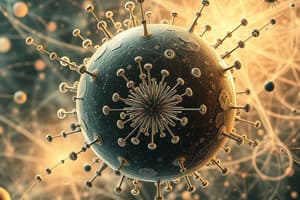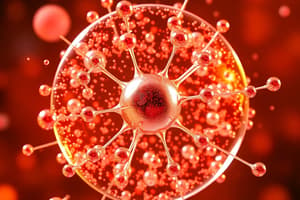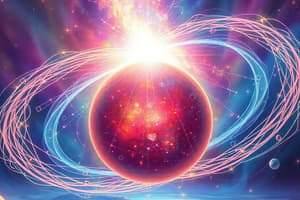Podcast
Questions and Answers
Which statement best describes the particles in a liquid state of matter?
Which statement best describes the particles in a liquid state of matter?
- They are far apart and move randomly.
- They are packed tightly and do not move.
- They are loosely packed and take the container's shape. (correct)
- They have a definite shape and fixed position.
What is the SI unit for measuring mass?
What is the SI unit for measuring mass?
- Grams (g)
- Liters (L)
- Pounds (lb)
- Kilogram (Kg) (correct)
Which of the following is a characteristic of gases?
Which of the following is a characteristic of gases?
- Particles move slowly and are organized.
- Particles have a definite shape and volume.
- Particles are closely packed and fixed.
- Particles are far apart and highly compressible. (correct)
Which of the following lists includes only physical properties of matter?
Which of the following lists includes only physical properties of matter?
What happens to the mass of matter during a physical change?
What happens to the mass of matter during a physical change?
What fundamental quantity of matter refers to the extent of space that objects occupy?
What fundamental quantity of matter refers to the extent of space that objects occupy?
Which of the following states of matter has a definite shape and volume?
Which of the following states of matter has a definite shape and volume?
Which fundamental building block of matter is arranged in various ways to form substances?
Which fundamental building block of matter is arranged in various ways to form substances?
Flashcards are hidden until you start studying
Study Notes
Properties of Matter
- Liquids have particles that are loosely packed, allowing them to take the shape of their container.
- Matter is any substance that occupies space and has mass.
- Gas particles are widely spaced, move fast, and are randomly organized, resulting in no definite shape or volume; they have high kinetic energy.
Structure of Matter
- Atoms and molecules are the fundamental building blocks of all matter.
- Space is a boundless three-dimensional expanse where objects exist and events occur, defined by positions and directions.
Fundamental Quantities of Matter
- Mass is a critical property measured in kilograms (Kg) and quantifies the amount of matter in an object.
- The seven fundamental quantities of matter are: length, mass, time, electric current, temperature, amount of substance, and luminous intensity.
Physical Properties of Matter
- Key physical properties include shape, size, color, and temperature, which describe the characteristics of matter without changing its identity.
Chemical Properties of Matter
- Chemical properties involve how substances react and change, including reactivity, flammability, and the ability to rust.
- A chemical change alters the composition of a substance, producing new forms of matter with different physical properties.
Law of Conservation of Matter
- Matter can change in size, shape, and form, but the total mass remains constant before and after any transformation.
- The quantity of matter is conserved; it is neither created nor destroyed in a chemical reaction or physical change.
States of Matter
- There are three primary states: solid, liquid, and gas, with additional states including plasma, Bose-Einstein condensate, quark-gluon plasma, and degenerate matter.
Studying That Suits You
Use AI to generate personalized quizzes and flashcards to suit your learning preferences.




